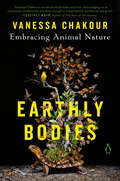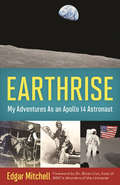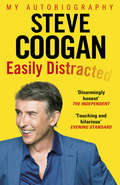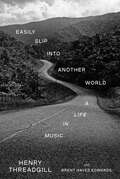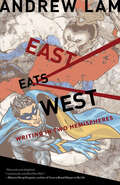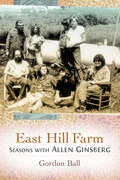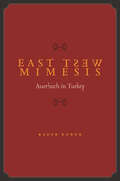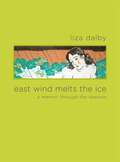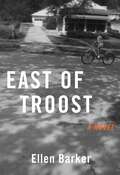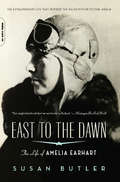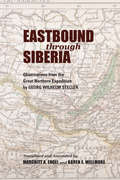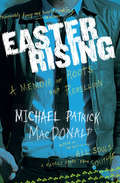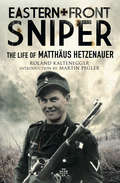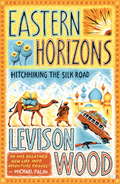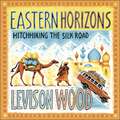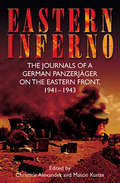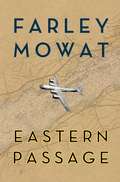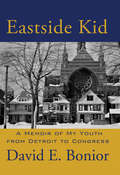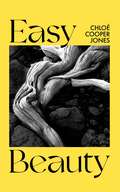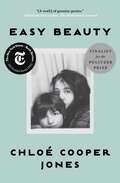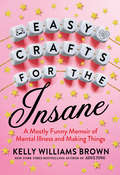- Table View
- List View
Earthly Bodies: Embracing Animal Nature
by Vanessa ChakourExamining the cultural belief that our animal instincts are to be corrected or corralled, nature advocate and rewilding facilitator Vanessa Chakour explores our inner and outer landscapes through the lens of wild animals.How can wolves, misunderstood in myths but vital to ecosystems, teach us to rewrite dangerous stories and respect nature&’s wisdom? How do the peaceful coexistence strategies of black bears offer insights into sharing resources? How can the engineering feats of beavers guide us in fostering regenerative building solutions and vibrant ecosystems? What can the loyal partnership of seahorses teach us about nurturing and love?In Earthly Bodies, Vanessa draws parallels from struggles she has weathered in her own life to those endured by twenty-three wild animals—from wolves to sea lions—exploring our unease of feeling like prey; challenging the entrapment of our limiting beliefs; contextualizing the turmoil of fractured landscapes; and affirming our primal ache to belong. Vanessa&’s pivotal encounters with creatures in sync with their primal rhythms and demands illustrate the necessity of relying on the intelligence of gut instinct; of the magnetic pull of attraction; of the body&’s mandate for restorative rest; and of the sacred bonds of love. We often cut ourselves off from identifying with wild animals—like wolves, foxes, bats and bears, and other animal relatives—out of fear, ignorance, disgust, or misunderstanding, yet our earthly human bodies can lead us in our pursuits of pleasure, love, wonder, healing, and connection.With each section containing an aspect of injured animal&’s return home to their natural habitat, and—in our case—to an embodied, instinctual self, Earthly Bodies meditates on how this journey from enclosures, to rehabilitation, to soft release, and finally to homing raises questions about our humanity. In so learning, we understand how we might benefit from embracing our own animal nature to gain deeper self-actualization, find common ground with our fellow animals, and learn to thrive together.
Earthly Signs: Moscow Diaries, 1917-1922
by Jamey Gambrell Marina TsvetaevaA moving collection of autobiographical essays from a Russian poet and refugee of the Bolshevik Revolution.Marina Tsvetaeva ranks with Anna Akhmatova, Osip Mandelstam, and Boris Pasternak as one of Russia’s greatest twentieth-century poets. Her suicide at the age of forty-eight was the tragic culmination of a life buffeted by political upheaval. The essays collected in this volume are based on diaries she kept during the turbulent years of the Revolution and Civil War. In them she records conversations of women in the markets, soldiers and peasants on the train traveling from the Crimea to Moscow in October 1917, fighting in the streets of Moscow, a frantic scramble with co-workers to dig frozen potatoes out of a cellar, and poetry readings organized by a newly minted Soviet bohemia. Alone in Moscow with two small children, no income, and a missing husband, Tsvetaeva struggled to feed her daughters (one of whom died of malnutrition in an orphanage), find employment in the Soviet bureaucracy, and keep writing poetry. Her keen and ruthless eye observes with compassion and humor—bringing the social, economic, and cultural chaos of the period to life. These autobiographical writings not only give a vivid eyewitness account of Russian history but provide vital insights into the workings of Tsvetaeva’s unique poetics.Includes black and white photographs.
Earthrise: My Adventures as an Apollo 14 Astronaut
by Ellen Mahoney Dr Brian Cox Edgar MitchellThe inspiring and fascinating biography of the sixth man to ever walk on the Moon Of the nearly seven billion people who live on Earth, only 12 have walked on the Moon and Dr. Edgar Mitchell was one of them. Earthrise is a vibrant memoir for young adults featuring the life story of this internationally known Apollo 14 astronaut. The book focuses on Edgar's amazing journey to the Moon in 1971 and highlights the many steps he took to get there, including growing up as a farm boy on a ranch; living in Roswell, New Mexico, during the alleged UFO crash; graduating from Carnegie Mellon and MIT; being a navy combat pilot; and becoming a NASA astronaut. In engaging and suspenseful prose he details his historic flight to the Moon, describing everything from the very practical--eating, sleeping, and going to the bathroom in space--to the metaphysical, such as the life-changing sensation of connectedness to the universe that he felt and that has been described, in varying degrees, by many astronauts. Extensive resources include annotated lists of websites about space, museums and organizations, films and videos, and books for further reading.
Easily Distracted
by Steve CooganSteve Coogan was born and raised in Manchester in the 1960s, the fourth of six children. From an early age he entertained his family with impressions and was often told he should 'be on the telly'. Failing to get into any of the London-based drama schools, he accepted a place at Manchester Polytechnic School of Theatre and before graduating had been given his first break as a voice artist on the satirical puppet show Spitting Image. The late eighties and early nineties saw Coogan developing characters he could perform on the comedy circuit, from Ernest Moss to Paul Calf, and in 1992 he won a Perrier award with John Thomson. It was around the same time, while working with Armando Iannucci and Patrick Marber on On The Hour and The Day Today, that Alan Partridge emerged, almost fully formed. Coogan, once a tabloid fixture, is now a respected film actor, writer and producer. He runs his own production company, Baby Cow, has a raft of films to his name (from 24 Hour Party People to Alpha Papa, the critically-acclaimed Partridge film), six Baftas and seven Comedy Awards. He has found huge success in recent years with both The Trip and Philomena, the latter bringing him two Oscar nominations, for producing and co-writing.In Easily Distracted he lifts the lid on the real Steve Coogan, writing with distinctive humour and an unexpected candour about a noisy childhood surrounded by foster kids, his attention-seeking teenage years and his emergence as a household name with the birth of Alan Partridge.
Easily Slip into Another World: A Life in Music
by Henry Threadgill Brent Hayes EdwardsAn autobiography of one of the towering figures of contemporary American music and a powerful meditation on history, race, capitalism, and art.Henry Threadgill has had a singular life in music. At 79, the saxophonist, flautist, and celebrated composer is one of three jazz artists (along with Ornette Coleman and Wynton Marsalis) to have won a Pulitzer Prize. In Easily Slip into Another World, Threadgill recalls his childhood and upbringing in Chicago, his family life and education, and his brilliant career in music.Here are riveting recollections of the music scene in Chicago in the early 1960s, when Threadgill developed his craft among friends and schoolmates who would go on to form the core of the highly influential Association for the Advancement of Creative Musicians (AACM); the year and a half he spent touring with an evangelical preacher in the mid-1960s; his military service in Vietnam—a riveting tale in itself, but also representative of an under-recognized aspect of jazz history, given the number of musicians in Threadgill&’s generation who served in the armed forces.We appreciate his genius as he travels to the Netherlands, Venezuela, Trinidad, Sicily, and Goa enriching his art; immerses himself in the volatile downtown scene in New York City in the 1970s and 1980s; collaborates with choreographers, writers, and theater directors as well as an astonishing range of musicians, from AACM stalwarts (Muhal Richard Abrams, Roscoe Mitchell, Wadada Leo Smith, and Leroy Jenkins), to Chicago bluesmen, downtown luminaries, and world music innovators; shares his impressions of the recording industry his perspectives on music education and the history of Black music in the United States; and, of course, accounts for his work with the various ensembles he has directed over the past five decades.
East Asian Film Stars
by Leung Wing-Fai Andy WillisMany stars from China, Japan and Korea are the most popular and instantly recognizable in the world. East Asian Film Stars brings together some of the world's leading cinema scholars to offer their insights into the work of regional and transnational screen legends, contemporary superstars and mysterious cult personas.
East Eats West: Writing in Two Hemispheres
by Andrew LamFrom cuisine and martial arts to sex and self-esteem, East Eats West shines new light on the bridges and crossroads where two hemispheres meld into one worldwide “immigrant nation.” In this new nation, with its amalgamation of divergent ideas, tastes, and styles, today's bold fusion becomes tomorrow's classic. But while the space between East and West continues to shrink in this age of globalization, some cultural gaps remain. In this collection of twenty-one personal essays, Andrew Lam, the award-winning author of Perfume Dreams, continues to explore the Vietnamese diaspora, this time concentrating not only on how the East and West have changed but how they are changing each other. Lively and engaging, East Eats West searches for meaning in nebulous territory charted by very few. Part memoir, part meditation, and part cultural anthropology, East Eats West is about thriving in the West with one foot still in the East.
East Eats West: Writing in Two Hemispheres
by Andrew Lam“Includes some of Lam’s most memorable writings, about cuisine, self-esteem, sex and kung fu, all seen from a two-hemisphere perspective.” —SFGate East Eats West shines new light on the bridges and crossroads where two global regions meld into one worldwide “immigrant nation.” In this new nation, with its amalgamation of divergent ideas, tastes, and styles, today’s bold fusion becomes tomorrow’s classic. But while the space between East and West continues to shrink in this age of globalization, some cultural gaps remain. In this collection of twenty-one personal essays, Andrew Lam, the award-winning author of Perfume Dreams, continues to explore the Vietnamese diaspora, this time concentrating not only on how the East and West have changed but how they are changing each other. Lively and engaging, East Eats West searches for meaning in nebulous territory charted by very few. Part memoir, part meditation, and part cultural anthropology, East Eats West is about thriving in the West with one foot still in the East.“In these lovely, wise, probing essays, Andrew Lam not only illuminates the crucial twenty-first-century issues of immigration and cultural identity but the greater, enduring issues of what it means to be human . . . a compelling book.” —Robert Olen Butler, Pulitzer Prize–winning author “Andrew Lam is an expert time-traveler, collapsing childhood and adulthood; years of war and peace; and the evolution of language in his own life, time, and mind. To read Andrew’s work is a joy and a profound journey.” —Farai Chideya, author of The Episodic Career“One of the best American essayists of his generation.” —Wayne Karlin, author of A Wolf by the Ears
East Hill Farm: Seasons with Allen Ginsberg
by Gordon Ball"This was Allen Ginsberg," Gordon Ball declared after recounting intimate moments with the cultural icon and beloved Beat Generation poet on East Hill Farm, outside Cherry Valley, New York.During the late 1960s, when peace, drugs, and free love were direct challenges to conventional society, Allen Ginsberg, treasurer of the Committee on Poetry, Inc., funded what he hoped was "a haven for comrades in distress" in rural upstate New York. First described as an uninspiring, dilapidated four-bedroom house with acres of untended land, including the graves of its first residents, East Hill Farm became home to those who sought pastoral enlightenment in the presence of Ginsberg's brilliance and generosity.A self-declared member of a "ragtag group of urban castoffs," including Gregory Corso, Peter Orlovsky, Herbert Huncke, and the mythic Barbara Rubin, farm manager Ball tended to a non-stop flurry of guests, chores, and emotional outbursts while also making time to sit quietly with Ginsberg and discuss poetry, Kerouac, sex, and America's war in Vietnam.In honest and vivid prose, Ball offers a rare intimate glimpse of the poetic pillar of the Beat Generation as a striving and accessible human being at home on the farm and in the world.
East West Mimesis: Auerbach in Turkey
by Kader KonukEast West Mimesis follows the plight of German-Jewish humanists who escaped Nazi persecution by seeking exile in a Muslim-dominated society. Kader Konuk asks why philologists like Erich Auerbach found humanism at home in Istanbul at the very moment it was banished from Europe. She challenges the notion of exile as synonymous with intellectual isolation and shows the reciprocal effects of German émigrés on Turkey's humanist reform movement. By making literary critical concepts productive for our understanding of Turkish cultural history, the book provides a new approach to the study of East-West relations. Central to the book is Erich Auerbach's Mimesis: The Representation of Reality in Western Literature, written in Istanbul after he fled Germany in 1936. Konuk draws on some of Auerbach's key concepts--figure as a way of conceptualizing history and mimesis as a means of representing reality--to show how Istanbul shaped Mimesis and to understand Turkey's humanist reform movement as a type of cultural mimesis.
East Wind Melts the Ice: A Memoir through the Seasons
by Liza DalbyWriting in luminous prose, Liza Dalby brings us this elegant and unique year's journal-- a brilliant mosaic that is at once a candid memoir, a gardener's diary, and an enlightening excursion through cultures east and west. In the essays, Dalby transports us from her Berkeley garden to the streets of Kyoto, to Imperial China, to the sea cliffs of Northern California, and to points beyond.
East of Troost: A Novel
by Ellen BarkerUnder the guise of a starting-over story, this novel deals with subtle racism today, overt racism in the past, and soul-searching about what to do about it in everyday living. East of Troost&’s fictional narrator has moved back to her childhood home in a neighborhood that is now mostly Black and vastly changed by an expressway that displaced hundreds of families. It is the area located east of Troost Avenue, an invisible barrier created in the early 1900s to keep the west side of Kansas City white, &“safely&” cordoned off from the Black families on the east side. When the narrator moves back to her old neighborhood in pursuit of a sense of home, she deals with crime, home repair, and skepticism—what is this middle-aged white woman doing here, living alone? Supported by a wise neighbor, a stalwart dog, and the local hardware store, we see her navigate her adult world while we get glimpses of author Ellen Barker&’s real life there as a teenager in the sixties, when white families were fleeing and Black families moving in—and sometimes back out when met with hatred and violence. A regional story with universal themes, East of Troost goes to the basics of human behavior: compassion and cruelty, fear and courage, comedy and drama.
East to the Dawn: The Life of Amelia Earhart
by Susan ButlerJournalist Butler deepens the familiar picture of the US flier who vanished mysteriously in 1937 to reveal Earhart's personae as an educator, a social worker, a lecturer, a businesswoman, and a promoter of women's rights. She also provides details about that last flight and wades through the accumulated mythology to seek a reasonable explanation for her loss. Annotation c. by Book News, Inc. , Portland, Or.
Eastbound through Siberia: Observations from the Great Northern Expedition
by Georg Wilhelm Steller“Traveling with Steller as he botanizes his way across Siberia is part wilderness adventure, part open air museum visit, and a valuable historical window.” —Erika Monahan, author of The Merchants of SiberiaIn the winter of 1739, Georg Steller received word from Empress Anna of Russia that he was to embark on a secret expedition to the far reaches of Siberia as a member of the Great Northern Expedition. While searching for economic possibilities and strategic advantages, Steller was to send back descriptions of everything he saw. The Empress’s instructions were detailed, from requests for a preserved whale brain to observing the child-rearing customs of local peoples, and Steller met the task with dedication, bravery, and a good measure of humor. In the name of science, Steller and his comrades confronted horse-swallowing bogs, leaped across ice floes, and survived countless close calls in their exploration of an unforgiving environment. Not stopping at lists of fishes, birds, and mammals, Steller also details the villages and the lives of those living there, from vice-governors to prostitutes. His writings rail against government corruption and the misuse of power while describing with empathy the lives of the poor and forgotten, with special attention toward Native peoples.“Not only showcases Steller the botanist but also reveals him as an admirable human being with a great sense of humor who managed to keep an upbeat attitude in the most trying circumstances.” —Eckehart J. Jäger“What emerges is a remarkable window into life—both human and animal—in 18th century Siberia.” —The Birdbooker Report“Adds fascinating details to the life of Steller and his travels and discoveries just before joining Bering in Kamchatka to set sail.” —Anchorage Daily News
Easter Rising: A Memoir of Roots and Rebellion
by Michael Patrick MacDonaldAn &“alternately funny and heartbreaking&” memoir of leaving—and finding—home, by the author of All Souls: A Family Story from Southie (Newsweek). In All Souls, Michael Patrick MacDonald told the story of the loss of four of his siblings to the violence, poverty, and gangsterism of Irish South Boston. In Easter Rising, he tells the story of how he got out. Desperate to avoid the &“normal&” life of Southie, Michael first reinvents himself in the burgeoning punk rock movement and the thrilling vortex of Johnny Rotten, Mission of Burma, and the Clash. At nineteen, he escapes further, to Paris and then London. Finally, out of money, he contacts his Irish immigrant grandfather—who offers a loan, but only if Michael will visit Ireland. It is on this reluctant journey to his ancestral land that Michael will find a chance at reconciliation—with his heritage, his neighborhood, and his family—and, ultimately, a way forward.
Eastern Front Sniper: The Life of Matthäus Hetzenauer (Greenhill Sniper Library)
by Roland KalteneggerEastern Front Sniper is a long overdue and comprehensive biography of one of World War IIs most accomplished snipers.Mathus Hetzenauer, the son of a Tyrolean peasant family, was born in December 1924. He was drafted into the Mountain Reserve Battalian 140 at the age of 18 but discharged five months later.He received a new draft notice in January 1943 for a post in the Styrian Truppenbungsplatz Seetal Alps where he met some of the best German snipers and learned his art.Hetzenauer went on to fight in Romania, Eastern Hungary and in Slovakia. As recognition for his more than 300 confirmed kills he was awarded on the Knight's Cross of the Iron Cross on April 17, 1945.After nearly five years of Soviet captivity Mathus Hetzenauer returned to Austria on January 10, 1950. He lived in the Tyrol's Brixen Valley until his death on 3 October of 2004.
Eastern Horizons: Shortlisted for the 2018 Edward Stanford Award
by Levison WoodLevison Wood was only 22 when he decided to hitch-hike from England to India through Russia, Iran, Afghanistan and Pakistan, but he wasn't the conventional follower of the hippy trail. A fascination with the deeds of the early explorers, a history degree in the bag, an army career already planned and a shoestring budget of £750 - including for the flight home - he was determined to find out more about the countries of the Caucasus and beyond - and meet the people who lived and worked there.EASTERN HORIZONS is a true traveller's tale in the tradition of the best of the genre, populated by a cast of eccentric characters; from mujahideen fighters to the Russian mafia. Along the way he meets some people who showed great hospitality, while others would rather have murdered him...
Eastern Horizons: Shortlisted for the 2018 Edward Stanford Award
by Levison WoodAward-winning TV adventurer and travel writer's enthralling account of his youthful expedition to Central Asia.Levison Wood was only 22 when he decided to hitch-hike from England to India through Russia, Iran, Afghanistan and Pakistan, but he wasn't the conventional follower of the hippy trail. A fascination with the deeds of the early explorers, a history degree in the bag, an army career already planned and a shoestring budget of £750 - including for the flight home - he was determined to find out more about the countries of the Caucasus and beyond - and meet the people who lived and worked there.EASTERN HORIZONS is a true traveller's tale in the tradition of the best of the genre, populated by a cast of eccentric characters; from mujahideen fighters to the Russian mafia. Along the way he meets some people who showed great hospitality, while others would rather have murdered him...This book confirms that Levison Wood, Winner of the 2016 Edward Stanford Adventure Travel Book Of The Year Award, has indeed 'breathed new life into adventure travel ' (Michael Palin) (P)2017 Hodder & Stoughton Limited
Eastern Inferno: The Journals of a German Panzerjäger on the Eastern Front, 1941–43
by Hans Roth&“Remarkable personal journals . . revealing the combat experience of the German-Russian War as seldom seen before . . . a harrowing yet poignant story&” (Military Times). Hans Roth was a member of the anti-tank panzerjager battalion, 299th Infantry Division, attached to the Sixth Army, as the invasion of Russia began. As events transpired, he recorded the tension as the Germans deployed on the Soviet frontier in June 1941. Then, a firestorm broke loose as the Wehrmacht tore across the front, forging into the primitive vastness of the East. During the Kiev encirclement, Roth&’s unit was under constant attack as the Soviets desperately tried to break through the German ring. At one point, after the enemy had finally been beaten, a friend serving with the SS led him to a site—possibly Babi Yar—where he witnessed civilians being massacred. After suffering through a brutal winter against apparently endless Russian reserves, his division went on the offensive again when the Germans drove toward Stalingrad. In these journals, attacks and counterattacks are described in you-are-there detail. Roth wrote privately, as if to keep himself sane, knowing his honest accounts of the horrors in the East could never pass Wehrmacht censors. When the Soviet counteroffensive of winter 1942 begins, his unit is stationed alongside the Italian 8th Army, and his observations of its collapse, as opposed to the reaction of the German troops sent to stiffen its front, are of special fascination. Roth&’s three journals were discovered many years after his disappearance, tucked away in the home of his brother. After his brother&’s death, his family discovered them and sent them to Rosel, Roth&’s wife. In time, Rosel handed down the journals to Erika, Roth&’s only daughter, who had emigrated to America. Roth was likely working on a fourth journal before he was reported missing in action in July 1944. Although his ultimate fate remains unknown, what he did leave behind, now finally revealed, is an incredible firsthand account of the horrific war the Germans waged in Russia.
Eastern Passage
by Farley MowatFollowing Farley Mowat's bestselling memoir, Otherwise, the literary lion returns with an unexpected triumphEastern Passage is a new and captivating piece of the puzzle of Farley Mowat's life: the years from his return from the north in the late 1940s to his discovery of Newfoundland and his love affair with the sea in the 1950s. This was a time in which he wrote his first books and weathered his first storms of controversy, a time when he was discovering himself through experiences that, as he writes, "go to the heart of who and what I was" during his formative years as a writer and activist.In the 1950s, with his career taking off but his first marriage troubled, Farley Mowat buys a piece of land northwest of Toronto and attempts to settle down. His accounts of building his home are by turns hilarious and affecting, while the insights into his early work and his relationship with his publishers offer a rare glimpse into the inner workings of a writer's career.But in the end, his restless soul could not be pinned to one place, and when his father offered him a chance to sail down the St. Lawrence, he jumped at it, not realizing that his journey would bring him face to face with one of Canada's more shocking secrets - one most of us still don't know today. This horrific incident, recalling as it did the lingering aftermath of war, and from which it took the area decades to recover, would forge the final tempering of Mowat as the activist we know today.Farley Mowat grows wiser and more courageous with each passing year, and Eastern Passage is a funny, astute, and moving book that reveals that there is more yet to this fascinating and beloved figure than we think we know.From the Hardcover edition.
Eastside Kid
by David E. BoniorDid you ever wonder what a member of congress was like as a juvenile roaming the streets of his or her neighborhood? Probably not. But nevertheless all of these people in our nation's capital were once kids. They grew up with a set of interests and values that they would take with them to the halls of a great democracy. Tracing his roots back to the small and large towns in Europe, Bonior recounts for us the coming of age of his boyhood in the Polish/Ukrainian community of Hamtramck, Michigan.The foundations of his boyhood, his Catholicism and athleticism, were where he often sought and found comfort. It was then he learned to embrace the struggle of the underdog. He was taught the value of work by a loving, yet taciturn father and grandfather. And he grew up faster than most boys his age as he lived with the specter of his mother's early death at 37 years of age. David Bonior was a working class kid with big dreams. This book is about the lessons of his youth and how he used them to navigate life on Detroit's Eastside. How he became a leader in his community on and off the sports field and then used those skills to become not only a member of congress, but the House Whip, the number two person in his party in the United States House of Representatives.This is a book of early memories. It's about "Elbowing his way into memory". It is about an American town where he took his first step, said his first word, and learned the fundamental life lessons that made him the legislator he was and the person he will always be. Fully illustrated with period and family photographs, this story is an invocation of a truly American life.
Easy Beauty
by Chloé Cooper Jones'BOLD, HONEST AND SUPERBLY WELL-WRITTEN' ANDRÉ ACIMAN, AUTHOR OF CALL ME BY YOUR NAME'GRACEFUL AND SOUL-BARING' MELANIE REID, THE TIMES'WHAT A GIFT . . . HAS THE RIGOR AND PRECISION OF JOAN DIDION AND MAGGIE NELSON AND A FORTHRIGHT HUMOR AND NAKED TRUTH ALL OF ITS OWN.' SARAH RUHL, AUTHOR OF SMILEI am in a bar in Brooklyn listening to two men, my friends, discuss whether or not my life was worth living.So begins Chloé Cooper Jones's bold account of moving through the world in a body that looks different than most. Born with a rare congenital condition called sacral agenesis, she must contend not only with her own physical pain, but the emotional discomfort of others.It is only when she unexpectedly becomes a mother that she confronts the demand to live life fully, propelling her on a journey across the globe, reclaiming the spaces she'd been denied, and denied herself.From Roman sculptures to a Beyoncé concert, from a tennis tournament to the Cambodian Killing Fields, Jones interrogates the myths of beauty with spiky intelligence, aesthetic philosophy, love and humor, inviting us to find a new way of seeing.
Easy Beauty
by Chloé Cooper Jones'GORGEOUS, VIVIDLY ALIVE' NEW YORK TIMES'BOLD, HONEST AND SUPERBLY WELL-WRITTEN' ANDRÉ ACIMAN, AUTHOR OF CALL ME BY YOUR NAME'GRACEFUL AND SOUL-BARING' MELANIE REID, THE TIMES'WHAT A GIFT . . . HAS THE RIGOR AND PRECISION OF JOAN DIDION AND MAGGIE NELSON AND A FORTHRIGHT HUMOR AND NAKED TRUTH ALL OF ITS OWN.' SARAH RUHL, AUTHOR OF SMILEI am in a bar in Brooklyn listening to two men, my friends, discuss whether or not my life was worth living.So begins Chloé Cooper Jones's bold account of moving through the world in a body that looks different than most. Born with a rare congenital condition called sacral agenesis, she must contend not only with her own physical pain, but the emotional discomfort of others.It is only when she unexpectedly becomes a mother that she confronts the demand to live life fully, propelling her on a journey across the globe, reclaiming the spaces she'd been denied, and denied herself.From Roman sculptures to a Beyoncé concert, from a tennis tournament to the Cambodian Killing Fields, Jones interrogates the myths of beauty with spiky intelligence, aesthetic philosophy, love and humor, inviting us to find a new way of seeing.
Easy Beauty: A Memoir
by Chloé Cooper JonesFrom Chloé Cooper Jones—Pulitzer Prize finalist, philosophy professor, Whiting Creative Nonfiction Grant recipient—a groundbreaking memoir about disability, motherhood, and a journey to far-flung places in search of a new way of seeing and being seen. <p><p> “I am in a bar in Brooklyn, listening to two men, my friends, discuss whether my life is worth living.” <p><p> So begins Chloé Cooper Jones’s bold, revealing account of moving through the world in a body that looks different than most. Jones learned early on to factor “pain calculations” into every plan, every situation. <p><p> Born with a rare congenital condition called sacral agenesis which affects both her stature and gait, her pain is physical. But there is also the pain of being judged and pitied for her appearance, of being dismissed as “less than.” The way she has been seen—or not seen—has informed her lens on the world her entire life. She resisted this reality by excelling academically and retreating to “the neutral room in her mind” until it passed. But after unexpectedly becoming a mother (in violation of unspoken social taboos about the disabled body), something in her shifts, and Jones sets off on a journey across the globe, reclaiming the spaces she’d been denied, and denied herself. <p><p> From the bars and domestic spaces of her life in Brooklyn to sculpture gardens in Rome; from film festivals in Utah to a Beyoncé concert in Milan; from a tennis tournament in California to the Killing Fields of Phnom Penh, Jones weaves memory, observation, experience, and aesthetic philosophy to probe the myths underlying our standards of beauty and desirability, and interrogates her own complicity in upholding those myths. With its emotional depth, its prodigious, spiky intelligence, its passion and humor, Easy Beauty is the rare memoir that has the power to make you see the world, and your place in it, with new eyes.
Easy Crafts for the Insane: A Mostly Funny Memoir of Mental Illness and Making Things
by Kelly Williams BrownFrom the New York Times bestselling author of Adulting comes a story about how to make something when you&’re capable of nothing. Kelly Williams Brown had 700 Bad Days. Her marriage collapsed, she broke three limbs in separate and unrelated incidents, her father was diagnosed with cancer, and she fell into a deep depression that ended in what could delicately be referred to as a &“rest cure&” at an inpatient facility. Before that, she had several very good years: she wrote a bestselling book, spoke at NASA, had a beautiful wedding, and inspired hundreds of thousands of readers to live as grown-ups in an often-screwed-up world, though these accomplishments mostly just made her feel fraudulent. One of the few things that kept her moving forward was, improbably, crafting. Not Martha Stewart–perfect crafting, either—what could be called &“simple,&” &“accessible&” or, perhaps, &“rustic&” creations were the joy and accomplishments she found in her worst days. To craft is to set things right in the littlest of ways; no matter how disconnected you feel, you can still fold a tiny paper star, and that&’s not nothing. In Easy Crafts for the Insane, crafting tutorials serve as the backdrop of a life dissolved, then glued back together. Surprising, humane, and utterly unforgettable, this is a poignant and hysterical look at the unexpected, messy coping mechanisms we use to find ourselves again.
